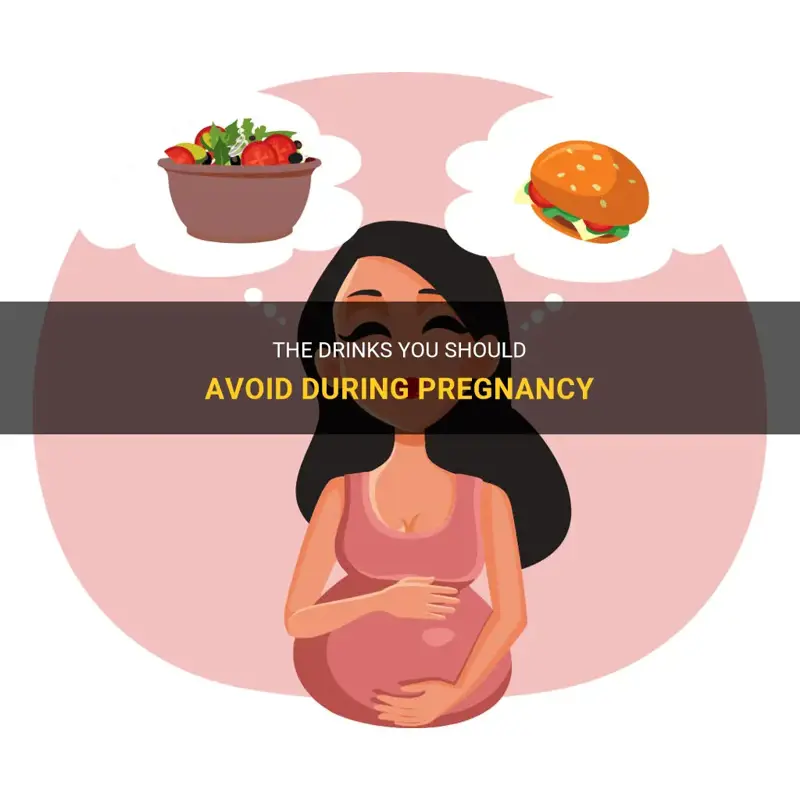
During pregnancy, it is important to be mindful of what you consume in order to provide the best possible environment for your growing baby. While there are many well-known food and drinks to avoid, such as alcohol and certain types of fish, the beverage options can sometimes be overlooked. In this article, we will explore some popular drinks that pregnant women should avoid and why, to help you make the best choices for you and your baby.
| Characteristics | Values |
|---|---|
| Caffeine | Limit intake |
| Alcohol | Avoid completely |
| Herbal tea | Check for safe options |
| Energy drinks | Avoid completely |
| Soft drinks and sugary beverages | Limit intake |
| Unpasteurized juices | Avoid completely |
| High-sugar fruit juices | Limit intake |
| Artificial sweeteners | Limit intake |
| High-mercury fish | Avoid completely |
| Fruit-flavored water | Limit intake |
What You'll Learn
- What are some of the most common drinks to avoid during pregnancy?
- Is it safe to consume caffeine during pregnancy and if not, what drinks contain it?
- Are there any alcoholic drinks that are safe to consume in moderation during pregnancy?
- Are there specific types of herbal teas or other non-alcoholic drinks that should be avoided during pregnancy?
- Is it safe to consume energy drinks or sports drinks while pregnant?

What are some of the most common drinks to avoid during pregnancy?
During pregnancy, it is important to be mindful of what you consume, as some drinks can potentially harm you and your growing baby. While it is always advisable to consult with your healthcare provider for personalized advice, here are some common drinks that are best to avoid during pregnancy.
- Alcohol: Alcohol is known to cause a range of birth defects and developmental issues. It can pass through the placenta and affect the baby's growth and development. There is no safe level of alcohol consumption during pregnancy, so it is best to completely avoid alcoholic drinks.
- Caffeinated Beverages: While moderate caffeine intake is generally considered safe during pregnancy, excessive consumption should be avoided. High levels of caffeine can increase the risk of miscarriage and low birth weight. So, it is advisable to limit your intake of coffee, tea, energy drinks, and sodas.
- Herbal Teas and Supplements: Some herbal teas and supplements may contain ingredients that can be harmful to your baby. Certain herbs like chamomile, ginger, and peppermint are generally safe in small amounts, but it is best to check with your doctor before incorporating them into your diet. Avoid herbal supplements unless recommended by your healthcare provider.
- Soft Drinks and Sugary Beverages: Drinks high in sugar, such as soft drinks, fruit juices, and sweetened beverages, should be consumed in moderation or avoided altogether. These drinks can contribute to excessive weight gain during pregnancy and increase the risk of gestational diabetes.
- Unpasteurized Juices and Dairy Products: Unpasteurized juices and dairy products can be a source of harmful bacteria like E. coli and Salmonella. Drinking these products can lead to food poisoning, which can have severe complications during pregnancy. It is crucial to choose pasteurized alternatives to ensure the safety of both you and your baby.
- Excessive amounts of Water: Although staying hydrated is important during pregnancy, it is possible to overhydrate. Drinking excessive amounts of water can disrupt the balance of electrolytes in your body and dilute essential nutrients. Aim for the recommended daily intake of water, which is about 8-10 cups per day, and consult with your healthcare provider for personalized hydration guidance.
- Energy Drinks: Energy drinks are often loaded with caffeine, sugar, and other stimulants that can be harmful during pregnancy. These drinks can increase heart rate and blood pressure, potentially affecting the baby's development. It is best to avoid energy drinks altogether during pregnancy.
Remember, every pregnancy is different, and individual circumstances may vary. It is always recommended to consult with your healthcare provider for personalized advice based on your specific needs and medical history. By being mindful of what you consume, you can help ensure a healthy pregnancy and the well-being of your baby.
Effective Tips to Minimize Snoring During Pregnancy
You may want to see also

Is it safe to consume caffeine during pregnancy and if not, what drinks contain it?
Pregnancy is an exciting and joyous time, but it also comes with its fair share of restrictions and precautions. One common question that many pregnant women have is whether it is safe to consume caffeine during pregnancy.
Caffeine is a naturally occurring stimulant found in various foods and beverages, including coffee, tea, chocolate, and certain soft drinks. It is known for its ability to increase alertness and improve mental performance. However, when it comes to pregnancy, the consumption of caffeine needs to be monitored carefully.
Studies have shown that excessive caffeine intake during pregnancy can have adverse effects on the developing fetus. High levels of caffeine consumption have been linked to an increased risk of miscarriage, preterm birth, low birth weight, and developmental delays. It is important to note that the effects of caffeine on pregnancy can vary from person to person, and each woman's tolerance to the substance may differ. However, it is generally advised to limit caffeine intake during pregnancy to minimize potential risks.
So, what drinks contain caffeine? While coffee is perhaps the most well-known source of caffeine, there are several other beverages that also contain this stimulant. Let's take a closer look:
- Tea: Both black and green tea contain caffeine, although the amount can vary. It's important to note that herbal teas, such as chamomile or peppermint, are naturally caffeine-free and can be consumed without worry.
- Soft drinks: Some soft drinks, particularly colas, contain caffeine. It is advisable to check the label for caffeine content and limit consumption accordingly.
- Energy drinks: Energy drinks often contain high levels of caffeine and other stimulants. These should be avoided during pregnancy due to their potentially harmful effects.
- Chocolate and cocoa-based products: Dark chocolate and cocoa powder contain caffeine. While the amount is generally lower compared to coffee or tea, it's still important to moderate consumption.
When it comes to caffeine intake during pregnancy, the key is moderation. The American College of Obstetricians and Gynecologists recommends limiting caffeine intake to 200 milligrams per day. This roughly translates to one 12-ounce cup of coffee. However, it's important to note that caffeine content can vary greatly between different coffee brands and brewing methods, so it's important to be mindful of your intake.
If you're unsure about the caffeine content of a particular beverage, there are several resources available to help you determine the exact amount. Online databases and smartphone apps can provide information on the caffeine content of various drinks, allowing you to make informed choices. It's also wise to consult with your healthcare provider for personalized advice based on your specific circumstances.
In conclusion, while it is generally safe to consume moderate levels of caffeine during pregnancy, it's important to be mindful of your intake. Limiting consumption to 200 milligrams per day and avoiding excessive amounts from various sources such as coffee, tea, soft drinks, energy drinks, and chocolate is advisable. By practicing moderation, you can enjoy your favorite caffeinated beverages while minimizing potential risks.
Tips for Preventing Pregnancy While Breastfeeding
You may want to see also

Are there any alcoholic drinks that are safe to consume in moderation during pregnancy?
Pregnancy is a time when many women carefully consider what they consume, and alcohol is no exception. The general consensus among healthcare professionals is that it is best to avoid alcohol altogether during pregnancy. However, some studies suggest that there may be certain alcoholic drinks that are safe to consume in moderation. Let's delve into this topic and explore the facts.
To begin with, it's important to understand why alcohol is generally discouraged during pregnancy. When a pregnant woman drinks alcohol, it crosses the placenta and reaches the developing fetus. The fetus's liver is underdeveloped and unable to metabolize alcohol as efficiently as an adult's liver, which means that alcohol can have a greater impact on the fetus's development and overall health. Heavy and prolonged alcohol consumption during pregnancy can lead to a condition known as fetal alcohol syndrome, which can result in physical, mental, and behavioral abnormalities in the child.
That being said, not all alcoholic drinks have the same alcohol content, and some sources argue that certain drinks may be safe to consume in moderation. For instance, beer and wine generally have a lower alcohol content compared to spirits. Some researchers suggest that consuming a small amount of beer or wine occasionally may not pose significant risks to the fetus.
However, it's worth noting that there is no consensus on a safe level of alcohol consumption during pregnancy. The Centers for Disease Control and Prevention (CDC) and the American College of Obstetricians and Gynecologists (ACOG) both recommend complete abstinence from alcohol during pregnancy. These organizations stress that there is no known safe amount or safe time to drink alcohol while pregnant.
Additionally, the concept of moderation can be subjective and difficult to define. What may be considered moderate consumption for one person may be excessive for another. It is crucial to keep in mind that every woman's body reacts differently to alcohol, and what may be safe for one pregnant woman may not be safe for another.
While some studies may suggest that certain alcoholic drinks can be consumed in moderation during pregnancy, it is important to prioritize the health and well-being of the baby. It is always better to err on the side of caution and abstain from alcohol completely during pregnancy. There are plenty of non-alcoholic alternatives available that can provide a similar sensory experience without the risks associated with alcohol consumption. Mocktails made with fresh fruits, herbs or sparkling water can be a delicious and safe option for pregnant women looking for a refreshing drink.
Ultimately, the decision regarding alcohol consumption during pregnancy should be made in consultation with a healthcare provider. They can provide personalized advice based on individual circumstances and medical history. When it comes to the health and development of the unborn baby, it is always better to be safe than sorry. So, it is best to avoid alcohol altogether during pregnancy, for the well-being of both the mother and baby.
Tips to Prevent Uterine Prolapse During Pregnancy
You may want to see also

Are there specific types of herbal teas or other non-alcoholic drinks that should be avoided during pregnancy?
During pregnancy, it is important for expectant mothers to be mindful of what they consume. While certain herbal teas and non-alcoholic drinks can offer various health benefits, there are also some that should be avoided. In this article, we will explore the types of herbal teas and non-alcoholic drinks that expectant mothers should steer clear of during pregnancy, and why they are not recommended.
- Caffeine-rich teas: Although small amounts of caffeine are generally considered safe during pregnancy, excessive caffeine consumption has been linked to complications such as preterm birth and low birth weight. Therefore, it is advisable for pregnant women to limit their intake of caffeine. This means avoiding teas that are high in caffeine, such as black tea, green tea, and oolong tea.
- Herbal teas with strong medicinal properties: While some herbal teas are considered safe during pregnancy, others have strong medicinal properties that can potentially harm the developing baby. For example, certain herbal teas like chamomile, peppermint, and ginger are generally considered safe in moderate amounts. However, herbal teas such as raspberry leaf tea and nettle tea are known to have stimulating effects on the uterus and may increase the risk of premature labor or miscarriage. It is best to consult with a healthcare provider before consuming any herbal teas during pregnancy.
- Artificially sweetened drinks: Some non-alcoholic drinks, such as artificially sweetened beverages, should also be avoided during pregnancy. These drinks often contain artificial sweeteners like saccharin or aspartame, which have been associated with adverse effects on fetal development. Instead, opt for naturally sweetened drinks or simply flavored water.
- Excessively sugary drinks: High sugar content in drinks can lead to gestational diabetes and excessive weight gain during pregnancy. It is important to avoid sugary drinks or limit their intake. Opt for healthier alternatives like infused water, herbal-infused water, or unsweetened fruit juices.
- Unpasteurized drinks: Unpasteurized drinks, including certain types of fruit juices and herbal beverages, should be avoided during pregnancy. These drinks can contain harmful bacteria such as Salmonella or E.coli, which can pose a risk to both the mother and the baby. Always make sure to choose pasteurized beverages to minimize the risk of foodborne illnesses.
It is important for pregnant women to consult with their healthcare provider before consuming any herbal teas or non-alcoholic drinks, as individual circumstances and pregnancy tolerances may vary. Additionally, it is advisable to choose well-known and trusted brands to ensure the safety and quality of the drinks consumed during pregnancy.
In conclusion, while there are various beneficial herbal teas and non-alcoholic drinks available, there are also some types that should be avoided during pregnancy. Caffeine-rich teas, herbal teas with strong medicinal properties, artificially sweetened drinks, excessively sugary drinks, and unpasteurized drinks should all be avoided to prioritize the health and well-being of both the mother and the developing baby. Always consult with a healthcare professional for personalized advice and guidelines during pregnancy.
Tips for Avoiding Hot Flashes During Pregnancy
You may want to see also

Is it safe to consume energy drinks or sports drinks while pregnant?
During pregnancy, it is important for expectant mothers to pay close attention to their diet and ensure they are consuming foods and beverages that are safe and beneficial for both themselves and their developing baby. In recent years, energy drinks and sports drinks have become increasingly popular among individuals looking for a quick way to boost their energy levels or rehydrate after physical activity. However, when it comes to consuming these types of beverages during pregnancy, it is essential to exercise caution.
Energy drinks, such as Red Bull or Monster, typically contain high levels of caffeine, sugar, and artificial additives. While it is generally considered safe for pregnant women to consume moderate amounts of caffeine, excessive intake can lead to negative effects on the developing baby. High levels of caffeine have been associated with an increased risk of miscarriage, preterm birth, low birth weight, and developmental delays. Therefore, it is advisable for pregnant women to limit their caffeine intake to 200 mg per day, which is equivalent to about one cup of coffee.
In addition to the high caffeine content, energy drinks often contain excessive amounts of sugar. Consuming large quantities of sugar during pregnancy can contribute to weight gain, increase the risk of gestational diabetes, and negatively impact maternal and fetal health. It is recommended to choose healthier alternatives, such as water, herbal tea, or fresh fruit juices, to stay hydrated and energized throughout the day.
On the other hand, sports drinks are specifically designed to rehydrate individuals after intense physical activity. They typically contain electrolytes, such as sodium and potassium, which help to replace fluids lost through sweating. While sports drinks can be beneficial for replenishing electrolytes in athletes or individuals engaging in prolonged strenuous exercise, they are generally unnecessary for the average person and especially for pregnant women.
Pregnant women can maintain adequate hydration by drinking water and eating a balanced diet that includes foods rich in electrolytes, such as fruits, vegetables, and dairy products. It is important to consult with a healthcare provider before consuming any sports drinks during pregnancy, as they may contain additional ingredients or additives that could be potentially harmful to the developing baby.
In conclusion, while it may be tempting to turn to energy drinks or sports drinks for a quick energy boost or rehydration during pregnancy, it is best to exercise caution and choose healthier alternatives. Pregnant women should limit their caffeine intake, avoid excessive amounts of sugar, and focus on maintaining hydration through water and a well-balanced diet. It is always recommended to consult with a healthcare provider before making any drastic changes to one's diet or consuming any potentially harmful substances during pregnancy.
How to Prevent a Saggy Belly After Pregnancy
You may want to see also
Frequently asked questions
No, it is strongly advised to avoid all forms of alcoholic beverages during pregnancy. Drinking alcohol while pregnant can cause serious harm to the developing baby, leading to a condition known as fetal alcohol spectrum disorders (FASDs). FASDs can cause physical and cognitive impairments that can have long-lasting effects on the child.
While moderate caffeine consumption is generally considered safe during pregnancy, it is recommended to limit your intake. High levels of caffeine have been associated with an increased risk of miscarriage, preterm birth, and low birth weight. It is suggested to limit your daily caffeine intake to 200 milligrams, which is roughly equivalent to one 12-ounce cup of coffee.
Not all herbal teas are safe to consume during pregnancy, as some may contain ingredients that can be harmful to the developing baby. It is best to consult with your healthcare provider before consuming any herbal teas. Some herbal teas that are generally considered safe during pregnancy include peppermint tea, ginger tea, and rooibos tea. However, it is important to note that moderation is key, and it is recommended to avoid excessive consumption of any herbal teas.







